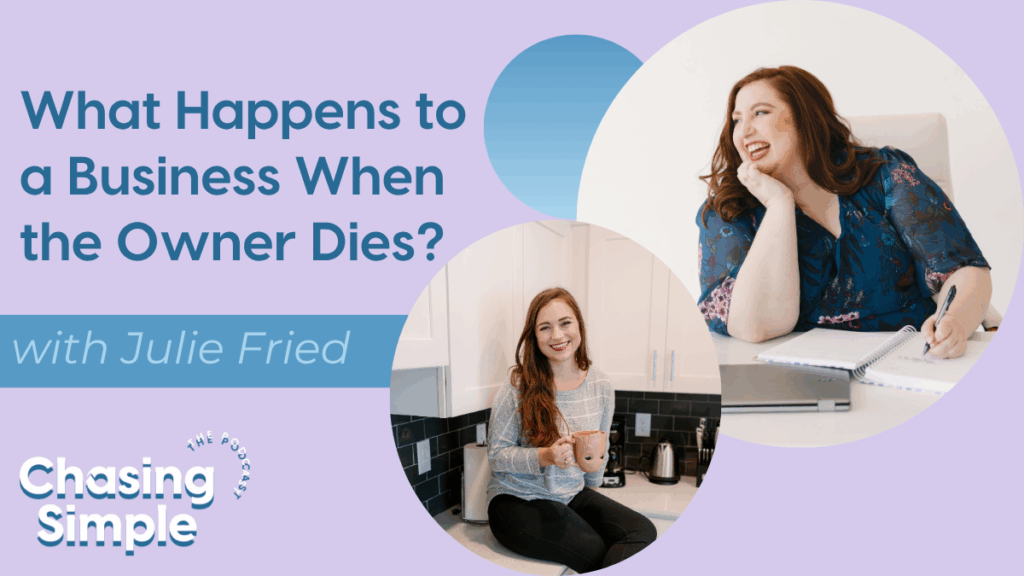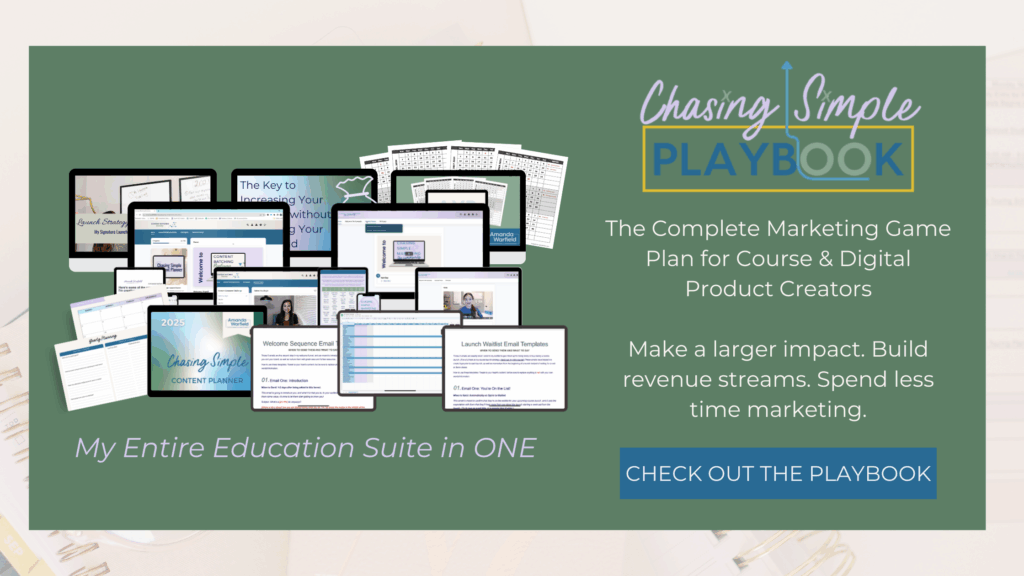Podcast: Play in new window | Download
Subscribe: RSS

The Question That Keeps Me Up at Night
It usually starts when I can’t sleep.
I lay there, wide-eyed in the dark, and my brain starts asking the hard questions:
What would happen to my business if I died?
Would Russell know what to do?
Who would email my clients? Cancel subscriptions? Find the tax info?
And even if it wasn’t death, what if I got in a car accident? Or needed to take an unexpected leave to care for a loved one? Or just couldn’t keep going for a while?
As entrepreneurs, we spend so much time planning for success. But very few of us take the time to plan for life happening.
That’s exactly why I brought my friend Julie Fried onto the podcast for a conversation I know we all need to hear—whether we’re ready for it or not.
Links and Resources Mentioned in This Episode:
- Stop into my YouTube channel for weekly videos about all things content marketing
- Check Out Julie’s Book Recs Highlight on her Instagram
- Recommended by Julie in this episode: 1password.com
- Tune in to Julie’s Podcast
- Julie’s Death Folder prepares you to take care of the one’s you love when you aren’t around
- Action Step: Determine one person to be your person for your death folder
- Book Rec: The Phantom Tollbooth by Norton Juster
- Creative Educator Conference
- Want your own live coaching session? Apply here
- Find me on Instagram and tell me what you thought of this episode: @mrsamandawarfield
Julie Fried: Creator of the Entrepreneur’s Death Folder
Julie is a former luxury wedding planner turned systems strategist. Today, she’s the creator of the Entrepreneur’s Death Folder and host of The System for Everything podcast.
Julie is also a mom, a chronic migraine warrior, and someone who deeply understands the messy overlap between life and business. And she’s on a mission to help entrepreneurs protect what they’ve built without the doom and gloom.
Her approach is practical, compassionate, and honestly—so needed in the online business world.
Because here’s the truth: most of us don’t have a plan for what happens to our business if we can’t be there to run it.
So… What Happens to a Business When the Owner Dies?
If there’s no plan in place? Chaos.
Clients are left wondering. Projects are abandoned. Subscriptions continue charging. Income disappears overnight. And grieving loved ones are left to untangle a digital mess they never signed up for.
Julie shared that even business owners with solid systems often forget to put this kind of emergency planning in place.
- You don’t need to be running a Fortune 500 company to need a plan.
- You don’t need to have a team.
- You don’t even need to be making six figures.
If your business brings in income—or serves people—it needs protection.
The Entrepreneur’s Death Folder: Not Just for the Worst-Case Scenario
Yes, the name might make you pause. That’s intentional. It’s memorable. But it’s not just for death.
Here are just a few other times this system comes in handy:
- Medical emergencies or mental health breaks
- A surprise adoption call (Julie had 8 hours notice before becoming a mom!)
- Chronic illness or burnout
- Sabbatical or extended leave
- Onboarding a new VA or team member
Whether you’re stepping away temporarily—or permanently—having a clear “just-in-case” system allows someone else to step in, support your people, and carry the work forward.
Why Most People Don’t Prepare (And Why You Still Should)
Let’s be honest—it’s easy to put this off.
- “It’s too morbid.”
- “It won’t happen to me.”
- “I don’t have time.”
- “My business isn’t that complicated.”
But as Julie says: this isn’t about fear—it’s about generosity.
You’re creating a gift.
Serving your people—your clients, your family, your business besties.
You’re reducing stress for the people who care about you.
It’s also a gift to yourself. Because once you’ve created your plan, you get to breathe easier knowing that you’re not holding all the strings alone anymore.
What’s Actually In the Entrepreneur’s Death Folder?
Julie calls it a “clarity file.” It’s not just SOPs and passwords—it’s everything someone would need to gracefully manage, pause, or close down your business in your absence.
Here’s what’s included:
- Who you serve + what you do
- Key logins, platforms, and subscriptions
- Current clients + upcoming deliverables
- What income is recurring + what needs to be turned off
- Key people to notify
- Digital legacy (podcast, email list, website, etc.)
- Where everything lives + how to access it
And the best part? It’s built to be simple and editable. Julie recommends updating it quarterly, just like you would your content plan or your goals.
Your First Step (It’s Not What You Think)
You don’t need to buy software, hire a lawyer, or create a 40-page manual to get started.
Julie recommends this as your first action step:
Pick one trusted person.
Send them a short note or voice memo. Tell them what you do, who you serve, and where your core systems live.
That’s it. That’s the first brick in your “just-in-case” foundation. You can build on it from there.
And if you want help pulling the rest together? Julie’s Entrepreneur’s Death Folder gives you a clear, step-by-step process to make it easy.
Get the Entrepreneur’s Death Folder here
What If You Never Need It?
That’s the dream, right?
But as Julie puts it, it’s like having car insurance—you don’t plan to use it, but you’re glad it’s there when you need it. And this is a whole lot cheaper than your monthly premium.
And here’s something we don’t talk about enough: this kind of system doesn’t just protect your business in an emergency—it can make your day-to-day operations easier too.
- You get clarity on what’s working (and what’s not).
- You’re more prepared to onboard help.
- You can delegate with less stress.
- You step into your role as the leader of your business.
Because building a business is about more than what you earn—it’s about the legacy you leave behind.
From Clutter to Clarity
Whether you’ve got a full team or it’s just you in your home office… your business matters. Your people matter. Your impact matters.
You don’t have to be perfect or have every SOP documented.
You just need a system that someone else could follow—if and when they needed to.
So here’s your nudge:
- Pick your person.
- Tell them the basics.
- Then go grab Julie’s Entrepreneur’s Death Folder and make your plan.
And if you’re looking for more practical, heartfelt conversations like this, be sure to listen to the full episode of the Chasing Simple Podcast.
Book Rec of the Week
This week’s pick (courtesy of Julie): The Phantom Tollbooth by Norton Juster
A whimsical, thought-provoking children’s book packed with adult-level insight. Julie reads it every summer, and it’s a beautiful reminder of why we build systems in the first place—to free up our minds and hearts for what really matters.
Let’s Leave Behind Clarity, Not Chaos
You may not get to choose what happens to you—but you can choose to leave behind peace instead of panic.
This isn’t about being morbid. It’s about being responsible. It’s about leading with love.
So let’s do this—together.

+ view comments . . .